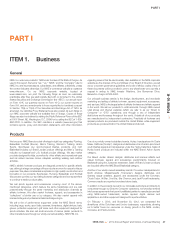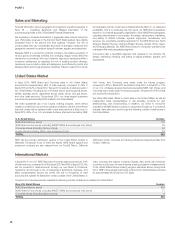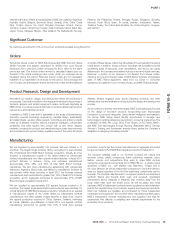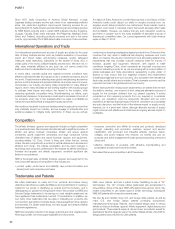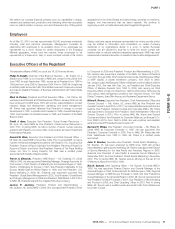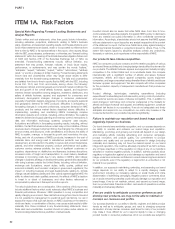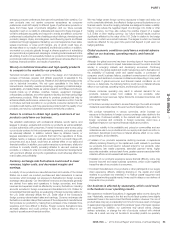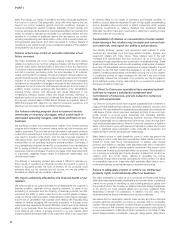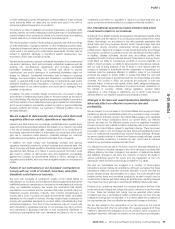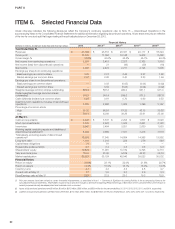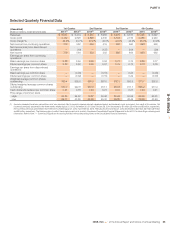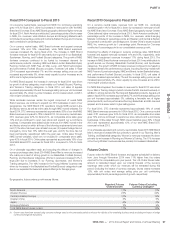Nike 2014 Annual Report Download - page 14
Download and view the complete annual report
Please find page 14 of the 2014 Nike annual report below. You can navigate through the pages in the report by either clicking on the pages listed below, or by using the keyword search tool below to find specific information within the annual report.
PART I
customers on a timely basis depends significantly on the reliability of these
information technology systems. Over a number of years, we have
implemented information technology systems in all of the geographical
regions in which we operate. Our work to integrate and enhance these
systems and related processes in our global operations is ongoing. The failure
of these systems to operate effectively or problems with transitioning to
upgraded or replacement systems could cause delays in product fulfillment
and reduced efficiency of our operations, could require significant capital
investments to remediate the problem, and may have an adverse effect on
our results of operations and financial condition.
We also use information technology systems to process financial information
and results of operations for internal reporting purposes and to comply with
regulatory financial reporting, legal, and tax requirements. If our information
technology systems suffer severe damage, disruption, or shutdown and our
business continuity plans do not effectively resolve the issues in a timely
manner, we could experience delays in reporting our financial results, which
could result in lost revenues and profits, as well as reputational damage.
Furthermore, we depend on information technology systems and personal
data collection and use for digital marketing, digital commerce, and the
marketing and use of our Digital Sport products. We also engage in electronic
communications throughout the world between and among our employees
as well as with other third parties, including customers, suppliers, vendors,
and consumers. Our information technology systems are critical to many of
our operating activities and our business processes and may be negatively
impacted by any service interruption or shutdown.
The market for prime real estate is competitive.
Our ability to effectively obtain real estate to open new retail stores and
otherwise conduct our operations, both domestically and internationally,
depends on the availability of real estate that meets our criteria for traffic,
square footage, co-tenancies, lease economics, demographics, and other
factors. We also must be able to effectively renew our existing real estate
leases. In addition, from time to time, we seek to downsize, consolidate,
reposition, or close some of our real estate locations, which may require
modification of an existing lease. Failure to secure adequate new locations or
successfully modify leases for existing locations, or failure to effectively
manage the profitability of our existing fleet of retail stores, could have an
adverse effect on our operating results and financial condition.
Additionally, the economic environment may at times make it difficult to
determine the fair market rent of real estate properties domestically and
internationally. This could impact the quality of our decisions to exercise lease
options at previously negotiated rents and to renew expiring leases at
negotiated rents. Any adverse effect on the quality of these decisions could
impact our ability to retain real estate locations adequate to meet our targets
or efficiently manage the profitability of our existing fleet of stores, which could
have an adverse effect on our operating results and financial condition.
Extreme weather conditions and natural disasters could
negatively impact our operating results and financial
condition.
Extreme weather conditions in the areas in which our retail stores, suppliers,
customers, and vendors are located could adversely affect our operating
results and financial condition. Moreover, natural disasters such as
earthquakes, hurricanes, and tsunamis, whether occurring in the United
States or abroad, and their related consequences and effects, including
energy shortages and public health issues, could disrupt our operations, the
operations of our vendors and other suppliers, or result in economic instability
that may negatively impact our operating results and financial condition.
Our financial results may be adversely affected if
substantial investments in businesses and operations fail
to produce expected returns.
From time to time, we may invest in business infrastructure, new businesses,
product offering and manufacturing innovation, and expansion of existing
businesses, such as our retail operations, which require substantial cash
investments and management attention. We believe cost-effective
investments are essential to business growth and profitability. However,
significant investments are subject to typical risks and uncertainties inherent in
developing a new business or expanding an existing business. The failure of
any significant investment to provide expected returns or profitability could
have a material adverse effect on our financial results and divert management
attention from more profitable business operations.
We are subject to periodic litigation and other regulatory
proceedings, which could result in unexpected expense of
time and resources.
From time to time we are called upon to defend ourselves against lawsuits
and regulatory actions relating to our business. Due to the inherent
uncertainties of litigation and regulatory proceedings, we cannot accurately
predict the ultimate outcome of any such proceedings. An unfavorable
outcome could have an adverse impact on our business, financial condition
and results of operations. In addition, any significant litigation in the future,
regardless of its merits, could divert management’s attention from our
operations and result in substantial legal fees.
We depend on key personnel, the loss of whom would
harm our business.
Our future success will depend in part on the continued service of key
executive officers and personnel. The loss of the services of any key individual
could harm our business. Our future success also depends on our ability to
recruit, retain, and motivate our personnel sufficiently, both to maintain our
current business and to execute our strategic initiatives. Competition for
employees in our industry is intense and we may not be successful in
attracting and retaining such personnel.
The sale of a large number of shares held by our Chairman
could depress the market price of our common stock.
As of June 30, 2014, Philip H. Knight, Co-founder and Chairman of our Board
of Directors, beneficially owned more than 75.1% of our Class A Common
Stock. If on June 30, 2014 all of his Class A Common Stock were converted
into Class B Common Stock, Mr. Knight would have owned more than
16.2% of our Class B Common Stock. These shares are available for resale,
subject to the requirements of the U.S. securities laws. The sale or prospect of
the sale of a substantial number of these shares could have an adverse effect
on the market price of our common stock.
Changes in our credit ratings or macroeconomic
conditions may affect our liquidity, increasing borrowing
costs and limiting our financing options.
Our long-term debt is currently rated investment grade by Standard & Poor’s
and Moody’s Investors Service. If our credit ratings are lowered, borrowing
costs for future long-term debt or short-term credit facilities may increase and
our financing options, including our access to the unsecured credit market,
could be limited. We may also be subject to restrictive covenants that would
reduce our flexibility. In addition, macroeconomic conditions, such as
increased volatility or disruption in the credit markets, could adversely affect
our ability to refinance existing debt or obtain additional financing to support
operations or to fund new initiatives.
Anti-takeover provisions may impair an acquisition of the
Company or reduce the price of our common stock.
There are provisions of our articles of incorporation and Oregon law that are
intended to protect shareholder interests by providing the Board of Directors
a means to attempt to deny coercive takeover attempts or to negotiate with a
potential acquirer in order to obtain more favorable terms. Such provisions
include a control share acquisition statute, a freeze-out statute, two classes of
stock that vote separately on certain issues, and the fact that holders of
Class A Common Stock elect three-quarters of the Board of Directors
rounded down to the next whole number. However, such provisions could
discourage, delay or prevent an unsolicited merger, acquisition, or other
change in control of our company that some shareholders might believe to be
in their best interests or in which shareholders might receive a premium for
their common stock over the prevailing market price. These provisions could
also discourage proxy contests for control of the Company.
NIKE, INC. 2014 Annual Report and Notice of Annual Meeting 57
FORM 10-K


